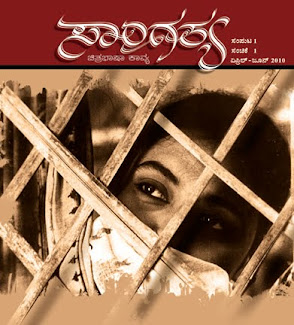
Muralidhara khajane
K.S. Ashwath, among Kannada cinema's real actors, is no more. Sadly, this "star-driven" industry made no exceptions to even a phenomenal actor like Ashwath. He, who lent a new dimension to every role that he played, Ashwath was truly someone who expanded the horizon of the supporting actor. How is it possible for any Kannada film lover to forget the role of Chamaiah Meshtru in the pathbreaking film, "Nagarahavu". It's more than a mere coincidence that both Chamaiah Meshtru and Ramachari, played by Vishnuvardhan, passed away within a gap of less than three weeks. In fact, close friends have said how Ashwath was heart broken when he heard Vishnuvardhan was no more. Struck by the character and its portrayal, director Shantharam made "Karnana Sampattu" in which he reimaged Chamaiah Meshtru.
Ashwath entered Kannada films as a hero in "Streerathna" (1954), but could not retain his position as hero for long. That, however, did not deter him from continuing his career in cinema. He opted for strong supporting roles and created a niche for himself. "Our film makers should realise that films are much more than the glorified heroism," he would often say underlining the role supporting actors had in the making of a good film.
Karaganahalli Subbaraya Ashwathanarayana, originally from Holenarsipura taluk was born in Mysore in 1925. His formal education came to an end at the intermediate level when he joined the freedom struggle in 1942. Two years later, he got a job as a Food Inspector. He later became a steno in the Deputy Commissioner's office. He spent ten years in Government service.
His acting career began, when he started participating in radio plays produced by Mysore All India Radio. His friendship with theatre people took him on stage too. He etched major roles in the plays of A.N. Murthy Rao, Parvathavani and others. Film director K. Subrahmanyam, who saw him in one of these plays, selected him for a role in "Streerathna". Unmindful of the family's stiff opposition, Ashwath gave up his government job and took the plunge. Of course, he was not flooded with offers. As fate would have it, his third child died of liver problem, just when he had made this difficult choice. With a heavy heart, Ashwath left for Madras, the seat of cinema in those days in search of work. There after, on his occasional visits to Karnataka he toured the districts with the drama troupes of his friends.
In 1960, he played the role of a Swamiji in "Kittur Chennamma" with B. Saroja Devi in the lead role. The same year he played Narada in the hit "Bhakta Prahlada". His role in "Gali Gopura" gave him an edge and helped shape his career as an artiste of immense calibre. Ashwath then got a role in the English film "Seven Wonders of the World' and even became the first Kannada actor in a colour film.
Several of his films became big hits. He won three national awards and several awards for being the best supporting actor. "I put everything into my roles and acting gave me a certain satisfaction. But if the roles I essayed didn't look natural, I would shrink in embarrassment," he would often say. Film critics who have studied Ashwath and his enormous contribution to Kannada cinema, were of the opinion that even when the main narrative of a film revolved around false social details, it was Ashwath who created a sub-text of authenticity, genuineness.
Among his best roles are "Nagarahavu", "Nandadeepa", "Gejjepuje", "Sharapanjara" "Jenugudu", "Nyayave Devaru" and "Belli Moda". Ashwath is the only one in "Sharapanjara" who sympathises with his daughter (Kalpana), who suffers from hallucinations. Similarly he is the only person (Chamayya Meshtru) to support and defend the angry young man Ramacharai (Vishnuvardhan), while society accuses and blames him. In "Gejje Puje" the anguish of protagonist gets soothing touch only because of Ashwath. A strict disciplinarian, his was the sane voice in most films that dealt with serious social issues.
After acting in nearly 300 films, he stopped acting a few years ago, because he was not happy the way Kannada industry was functioning. It was due to the insistence of his dear friend and fellow actor, Rajkumar that he changed his decision. He acted with the Kannada icon in "Shabdavedi". Regardless of his age, he acted in "Bhoopathi" and "Sirivantha" recently.
Ashwath who was suffering from Vetebro Basilar inefficiency, a disorder caused by high blood pressure, was going through difficult times. He was finding it hard to meet medical expenses. Despite his hardships, not once did he ask for help. However, Government, cine artists and social organisations came forward to help him.
The gentleman Ashwath who kept a low profile always, is no more. In him, we have not only lost a great actor but it is also the end of an era and a value system. "Lifestyle is changing, generation gap is widening. We have to gracefully accept the change," he would quietly say.


 11:43 PM
11:43 PM
 saangatya
saangatya



